It’s been a while since I last wrote a blog post as I’ve been busy with A Levels, but now that they’re over I’ve got plenty of time to write more blog posts over the summer!
Seeing as I have now left school, I thought that I would write a blog post about my experiences at school from nursery to sixth form.
I was diagnosed with dyspraxia at around the age of 3 to 4, which in some ways sounds great – just as I’m starting school, so just in time to make all of the teachers aware! But when the none of the teachers have even heard of dyspraxia before it’s really not that simple…
In nursery we were given a ‘keyworker’ and the name of mine was ‘Miss Whitbread’. The thing is, dyspraxia slightly affects my speech so I couldn’t pronounce her name properly. I really don’t think she would have been very happy about the way I pronounced her name – I pronounced it ‘Miss Shitbread’! The funny thing is though, at the time I genuinely didn’t realise that I was pronouncing her name wrong, let alone realise what I was actually saying! Me and my parents were walking through the car park to get in the car home from school one time and I said “So how do you say her name? Is it Miss Shitbread?” I was so confused when my parents seemed embarrassed and told me that wasn’t how you said it. To me it sounded like I was saying it right – sorry Miss *Whitbread!
Parents evening at nursery…I remember we were allowed to go and play while the teachers spoke to our parents. In other words, ‘go somewhere else while we talk about you’. It didn’t work…I could still hear them. I remember the teachers pointing out the fact that I couldn’t balance on a bench which was something they were concerned about. I’d just been diagnosed with dyspraxia, which affects balance. Why on earth they felt the need to point out that I was having difficulty balancing I have no idea!
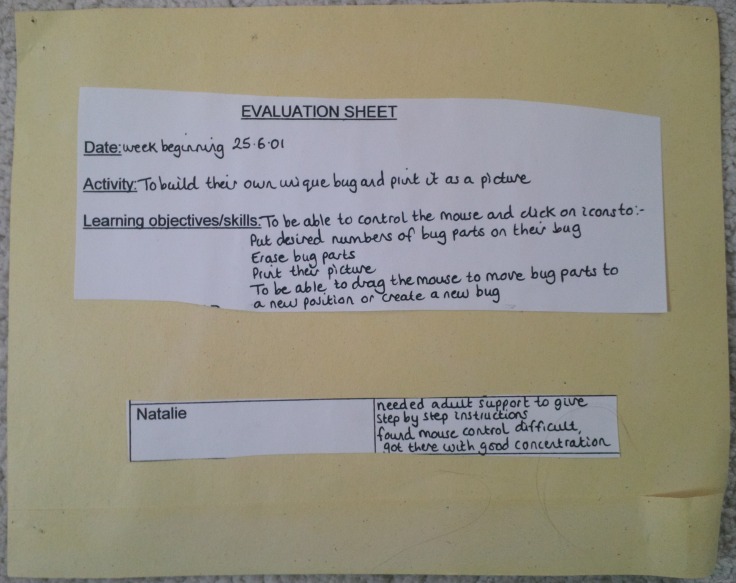 Looking back at this evaluation given for my work I can see how even in nursery dyspraxia not only affected me physically with my work, but also in terms of processing (needing step by step instructions). However, when I was diagnosed with dyspraxia my parents were only told about the physical aspects of it. It was through research on the internet and living with dyspraxia that me and my parents realised over the years that there is a lot more to it than just the physical aspects. I think this partly explains why my teachers didn’t have a good understanding of dyspraxia – as when my parents first explained it to them it would have been just the physical aspects they were told about. On the other hand, schools should have a good understanding of special needs/disabilities anyway, so they shouldn’t have had to rely purely on the explanation my parents gave…
Looking back at this evaluation given for my work I can see how even in nursery dyspraxia not only affected me physically with my work, but also in terms of processing (needing step by step instructions). However, when I was diagnosed with dyspraxia my parents were only told about the physical aspects of it. It was through research on the internet and living with dyspraxia that me and my parents realised over the years that there is a lot more to it than just the physical aspects. I think this partly explains why my teachers didn’t have a good understanding of dyspraxia – as when my parents first explained it to them it would have been just the physical aspects they were told about. On the other hand, schools should have a good understanding of special needs/disabilities anyway, so they shouldn’t have had to rely purely on the explanation my parents gave…

“Why has she put a random photo of a colouring-in sheet?” you may be asking yourself…there is a reason! I’m not sure why but I can really clearly remember doing this. I can even remember where I was sat. I was sat colouring this in with Miss Whitbread sat next to me (it’s hard to write her name without laughing now!) and either myself or her must have accidentally knocked over the tin of pencils as I remember them falling out and her saying to me “Did that make you jump?” At the time I had no idea what she meant by that – typical literal thinking.
As you can tell so far, my teachers really didn’t have an understanding of what dyspraxia was and throughout primary school it didn’t get much better…
Reception, my first year of school. In the mornings we had to write what we were going to do that day in our ‘Planning book’. Here are two pages of mine:
 I wonder what I did do those two days? They must have not given us very long to write. Well, not for me anyway. Either that or I was being very indecisive (which wouldn’t be very surprising!)
I wonder what I did do those two days? They must have not given us very long to write. Well, not for me anyway. Either that or I was being very indecisive (which wouldn’t be very surprising!)
Just a tip, don’t get someone with dyspraxia to write on paper that isn’t lined…
 It doesn’t turn out very well…
It doesn’t turn out very well…
It took me a while to figure out what I’d written in this poem, especially the last line! Eventually I figured out I think I was meant to put ‘abc’ not ‘abs’. For quite a few years I would seem to get ‘c’ and ‘s’ muddled up for some reason! My teacher seemed to like the poem though…
This made me laugh so much when I saw it. Earlier I mentioned that dyspraxia slightly affects my speech. Well, my Auntie’s name is Zilla and look what they wrote…
Out of all things to say I was good at, I have absolutely no idea why I put ‘running’.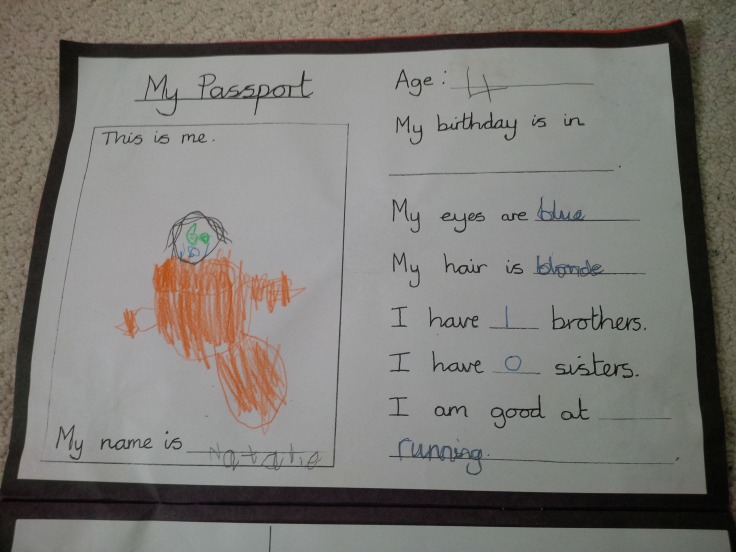 One memory I have of running when I was in reception was when I decided I would see how fast I could run from where I was to the fence. I ended up falling over and in first aid which is where I spent a lot of my break time/lunch time in primary school – I was always falling over! I remember a teacher asking me how I fell over and I said that I was just running. I was sat there thinking “Why would you have a reason for falling over?”
One memory I have of running when I was in reception was when I decided I would see how fast I could run from where I was to the fence. I ended up falling over and in first aid which is where I spent a lot of my break time/lunch time in primary school – I was always falling over! I remember a teacher asking me how I fell over and I said that I was just running. I was sat there thinking “Why would you have a reason for falling over?”
This was the general comment for my first school report:
 Notice how my teacher says that “Natalie can become upset at changes in routine or circumstances, but I anticipate that this will lessen as she matures.” Funnily enough I still don’t like changes in routine! And guess why? Because it’s part of my dyspraxia and you don’t just ‘grow out of’ dyspraxia!
Notice how my teacher says that “Natalie can become upset at changes in routine or circumstances, but I anticipate that this will lessen as she matures.” Funnily enough I still don’t like changes in routine! And guess why? Because it’s part of my dyspraxia and you don’t just ‘grow out of’ dyspraxia!
In year 1 we started doing ‘handwriting practice’. When they said to use the lines to write in I think I took it a bit too literally and actually wrote inside the lines…
 I got the hang of it eventually though:
I got the hang of it eventually though:
Another example of a task I took a bit too literally is where we had to fill in the sentence ‘I used to…but now…’ At the time I couldn’t see anything wrong with this answer at all but now I find it hilarious to look back on!
Something else I did related to my ‘literal thinking’ was in maths when teachers told us to ‘put a number in our head’ and then add the next number onto it. I would literally put my hand up to my head as if I was ‘putting the number into my head’. When my dad told me that I didn’t have to do that each time I said “But my teacher said to put the number in your head!”
Despite the fact that I would take much longer to complete schoolwork than others and it would take me a lot of effort to produce it, the presentation of it would look rushed meaning that teachers would tell me to ‘take more care’ with my work…
In year 1 we were given a ‘reading record’ which teachers would write comments in after we had read to them. Here’s a page of mine:
13 years later and I still pronounce ‘th’ as ‘d’! I know how you’re meant to pronounce it, but when it comes to actually pronouncing it it’s a different thing…
A typical dyspraxia response to “Write about what you did today”
“I went to physiotherapy”
On a Wednesday morning I would come back from physiotherapy and people in my class would say “Where were you?” Trying to explain what physiotherapy is when you’re 5 years old to other 5 year olds isn’t easy…
I didn’t go to physio for very long though, only a few weeks. The irony is, because of my dyspraxia, physio made me so tired that by the time I got into school I was exhausted. It also meant having to get up extremely early in the morning to travel there, so it just didn’t work out very well.
“The rainbow makes rainbow.” Well, technically a rainbow is a rainbow so it sort of makes sense… Okay, I probably wasn’t concentrating properly…
Memories of year 1:
“I enjoyed doing sports day” Well that was a lie! I despised sports day, the look on my face in this photo sums up what I thought about sports day:
During year 1 I had extra support with a teaching assistant in a small group. I don’t really remember much about it, apart from the fact that it had something to do with a puppet called ‘Pip’ (if anyone from my primary school is reading this and can remember what that was about I’d love to know).  Anyway, looking at my report it looks as though this group I was in was ‘additional learning support’. The weird thing is though, they didn’t discuss this with my parents at all. It’s as though they just thought “Lets just give everyone with special educational needs additional learning support without actually finding out what they need support with”.
Anyway, looking at my report it looks as though this group I was in was ‘additional learning support’. The weird thing is though, they didn’t discuss this with my parents at all. It’s as though they just thought “Lets just give everyone with special educational needs additional learning support without actually finding out what they need support with”.
Onto year 2… In one of our art lessons someone asked me why my drawing of a bridge was wonky, and I said it was because I had dyspraxia. They said “But so do I and my drawing isn’t like that.” It turned out they had dyslexia not dyspraxia! Oh and here’s the drawing by the way:
I think this was the painting we were supposed to be copying:
Totally identical aren’t they? Hard to tell the difference!
There’s a situation where at the time I wouldn’t have understood how my dyspraxia related to it but now looking back at it I can. One of my friends said to me that she would sit next to me at lunch. When it came to lunch time, someone else sat next to her and I had to sit somewhere else. This might sound like such a simple little thing but a change of plan does not mix well with someone with dyspraxia who loves their routine! So I had it in my head that I would be sitting next to that particular friend at lunch and when I couldn’t and my routine changed I got upset and started crying. The teacher who was on duty got very cross with me, which just made me even more upset! She said something along the lines of “Stop being so silly! If you carry on crying you’ll have to sit outside on the bench and eat your lunch all by yourself!” Great understanding of dyspraxia there…
On the plus side, in my report at the end of year 2 I did get a positive comment about the effort I’d put into P.E.:
By year 3 I think my teachers were beginning to understand how dyspraxia affected me in P.E. lessons, and unfortunately it was just at that point that they decided they would change the way they did P.E. lessons. They decided to get a teacher from an outside sports organisation to come in and teach the P.E. lessons, who would most likely have no idea what dyspraxia was…
The first teacher that came in to do P.E. lessons was okay. It was the teacher I had for P.E. lessons in years 4, 5 and 6 who wasn’t exactly ‘dyspraxia aware’ (I’ll talk about that later on in this blog post).
Around the time when I was in year 3 was when my dad had discovered the Dyspraxia Foundation website. This meant that he found out more about how Dyspraxia affected me other than the physical aspects. There was a time in year 3 when we had a task to do on our mini whiteboards. On these whiteboards, one side was lined and the other side was plain. The teachers would always say that we’d use the lined side for English because it was lined and the plain side for Maths. For me, this meant I had a very black and white view of how the whiteboard was to be used. So when we had finished doing some maths work on the plain side of the whiteboard and had to turn over to the other side to carry on doing maths work I said something to my teacher like “But we can’t use the lined side because it’s maths and we can’t do maths on the lined side.” I think her reply was something like “Don’t be silly.” I didn’t understand how it was silly at all! When I went home and told my dad about this he said that it was to do with dyspraxia. I didn’t understand how it was, but now I do.
During year 3 there was a school event where my dad was in school talking to my teacher. My teacher was saying to him that I should be able to use a skipping rope because she once taught a girl who had a prosthetic arm who was still able to skip with a skipping rope. She said it as though just because I still have four limbs I shouldn’t have a problem doing it, forgetting about the fact that my balance, co-ordination and my spatial awareness are affected…and all three are required to be able to skip…
It’s so frustrating when people make comparisons like that between different disabilities. They’re totally different and they affect people in different ways!
There was one time at lunch when I was having a school meal and was struggling to cut my food so put up my hand to ask a teacher for help. The teacher obviously didn’t know about my dyspraxia as she said to me “You should be old enough by now to cut it yourself.” I then said that I had dyspraxia and I think she then asked what it was…which isn’t exactly an unusual answer!
In year 4 we started to write longer pieces of writing and ‘dispraxia’ gets a mention in this one (it annoys me that I spelt it wrong)!
This was completely made up by the way! I thankfully didn’t get bullied for my dyspraxia, but I know that a lot of people with dyspraxia have unfortunately experienced bullying. Oh and my cousins wouldn’t bully me either!
When I was in primary school, though, I did get told by someone that everyone ‘treats me like a queen’ just because I have dyspraxia. I wouldn’t say that people in my class treated me any differently at all…
In year 4 we had our first trip where we stayed overnight. My dad spoke to my teacher beforehand about how my dyspraxia affected me and again, it was the comparison to other people. “Oh she’ll be fine. I taught a girl in a wheelchair a few years ago and she was fine on the trip so Natalie will have no problems.” Again, the teacher was forgetting the fact that dyspraxia is more than just physical…
On the trip it was going okay apart from the last day when I think how ‘different’ the setting, routine and everything else was got a bit too much for me. It started off in the morning packing my sleeping bag and I couldn’t get it in my bag properly. I was trying for ages and it was really frustrating and I got really stressed out over it, even though it’s such a simple thing. I should have just asked someone else to help really… I ended up crying and then being embarrassed because I felt like there was no reason for me to be crying. My teachers were really nice though and didn’t tell me to ‘stop being silly’ this time!
In my end of year report for year 4 my teacher actually mentioned dyspraxia for the first time. Teachers seemed to mention it before, but indirectly.
In year 5 during ‘science week’ a few members of our class were asked to give presentations to the class. I was asked if I would like to give a presentation about dyspraxia. The annoying thing is, I can’t really remember what I said so there’s not that much to say about it! I remember being quite relaxed about doing it though. I think that’s probably because everyone in my class knew I had dyspraxia anyway, although I’m not sure how much of it they understood. One person in my class once asked a teacher what dyspraxia was and said something like “Does it mean Natalie doesn’t have as much energy so she can’t run properly?” I think the teacher just said yes as it would have been too complicated to explain at the time, especially as that was when we were in year 1!
Looking back at some of my work from year 5 I noticed how my teacher commented on the fact that my work was unfinished:
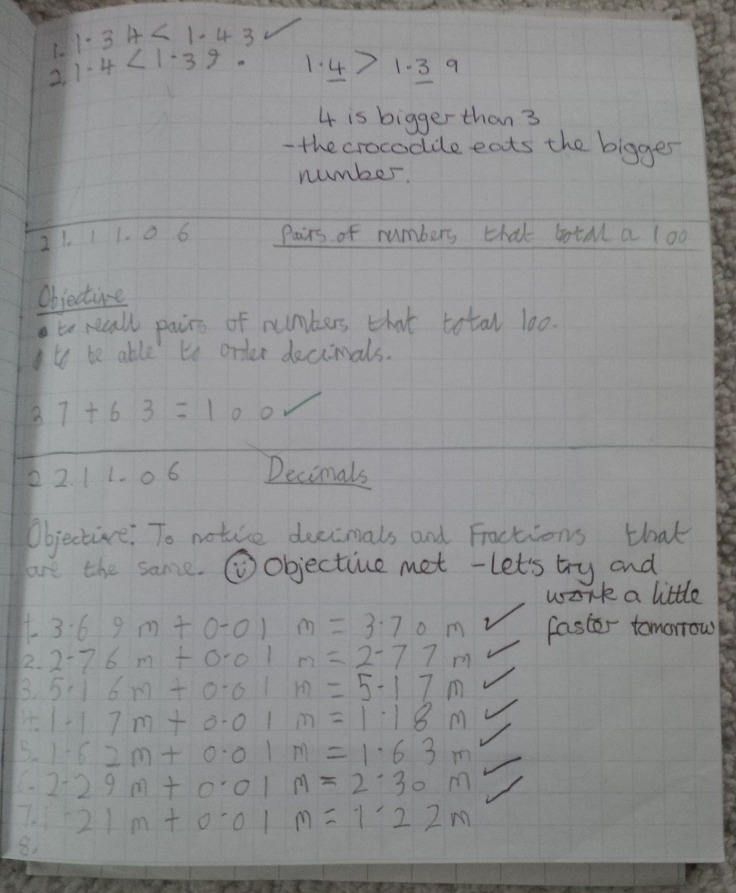
 Why so few Natalie? Because I have dyspraxia which affects my fine motor skills which means that drawing shapes using a pencil and ruler is much more difficult for me and takes me a lot longer than it does for other people!
Why so few Natalie? Because I have dyspraxia which affects my fine motor skills which means that drawing shapes using a pencil and ruler is much more difficult for me and takes me a lot longer than it does for other people!
This piece of work gave me an opportunity to use literal thinking to my advantage:
One time in year 5 when we had a cover lesson I was pleased with the fact that I’d actually finished my work on time for once. I went up to my teacher to tell them that I was finished so that I could move onto the next task only for them to tell me that my work was scruffy.
I’m pretty sure this was the work that we were doing at the time:
My dad spoke to the schools SENCo about it after school and she said that cover teachers should be aware of my dyspraxia – that one clearly wasn’t!
When I was in year 5 the school did put some sort of support into place for my Dyspraxia. They produced this table which had a certain part of it highlighted which said that all staff members would be aware of my dyspraxia. I was going to include it in this blog post but I can’t find it anywhere!
I actually had a positive comment about my handwriting here, now that does make a change!
The comment for P.E. on my end of year report said this:
What the teacher said in the report is different to what he said to me in the lesson… For example, one time we were playing cricket and I was fielding and despite trying hard to concentrate I started daydreaming and before I knew it the ball was right in front of me and I didn’t react in time to catch it and it hit me on the head. My teacher said to me: “That’ll teach you for not concentrating!” So, I really don’t think that he thought I had ‘an excellent attitude in P.E. lessons’.
Near the end of year 5 we had a class trip to Kingswood which included all sorts of activities such as abseiling, rock climbing, and go-karting. It did consist of a lot of physical activities but I really enjoyed it and I remember being so pleased when I reached the top of the wall in rock climbing! Although I did crash when we did go-karting…and my helmet went flying off… I had a positive comment from my teacher about the trip though!
Year 6 was very much focused on preparing for SATs. I was meant to have extra time arranged for this, but that never happened (what a surprise…)
This was one of the practice papers we did:
I found it really weird looking back at this because the paper was about the Paralympics. At the time I knew nothing about the Paralympics at all, so would never have thought that a year later I would be taking part in disability athletics!
Typical, a comment about my handwriting…
Although in the end of year report I did get another good comment about P.E.!
By the end of year 6 it looked like my teachers had realised the fact that P.E. was difficult for me – not sure what else they knew about dyspraxia though!
Next, secondary school…which will be in part 2!
Natalie 🙂
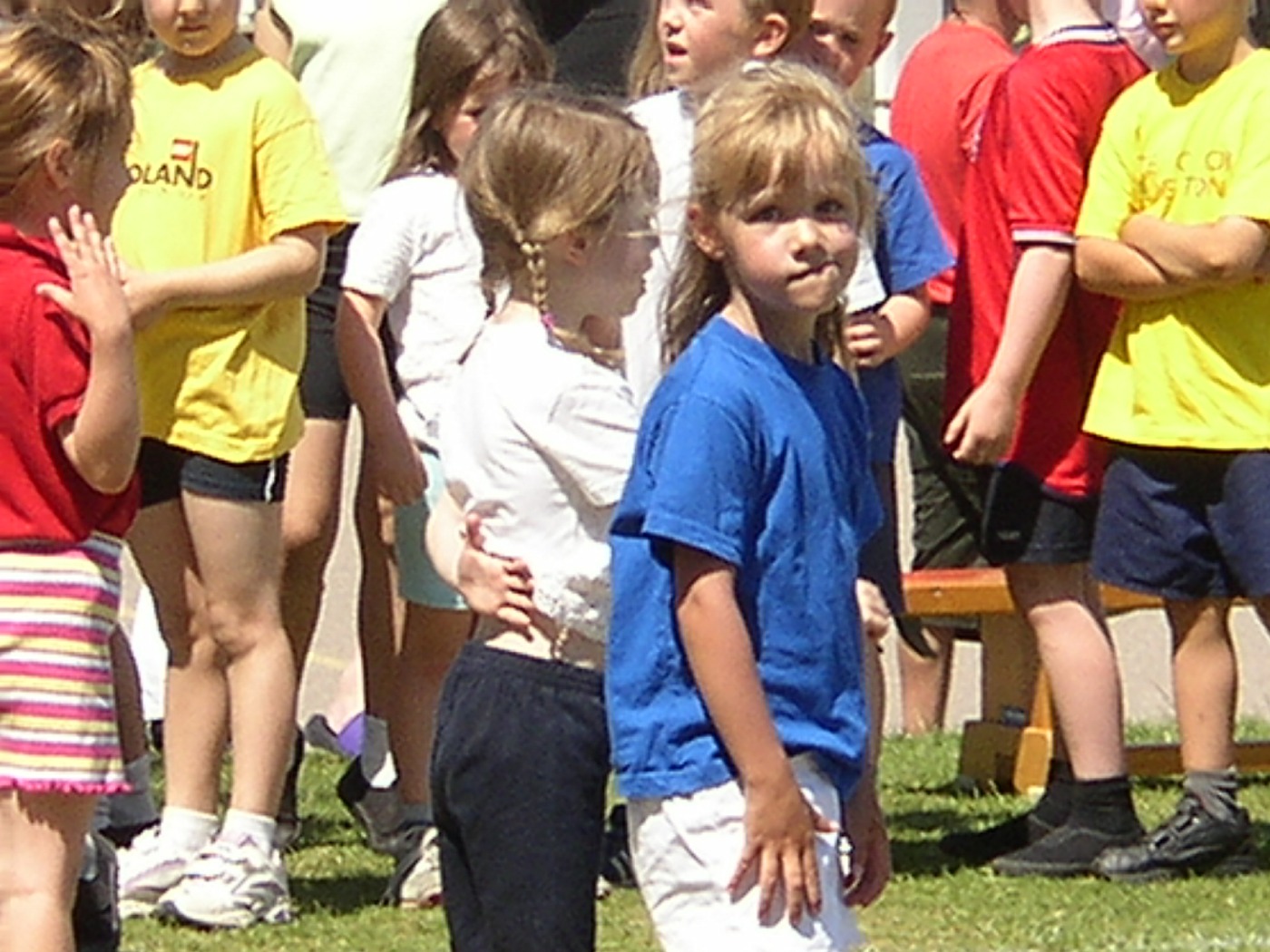

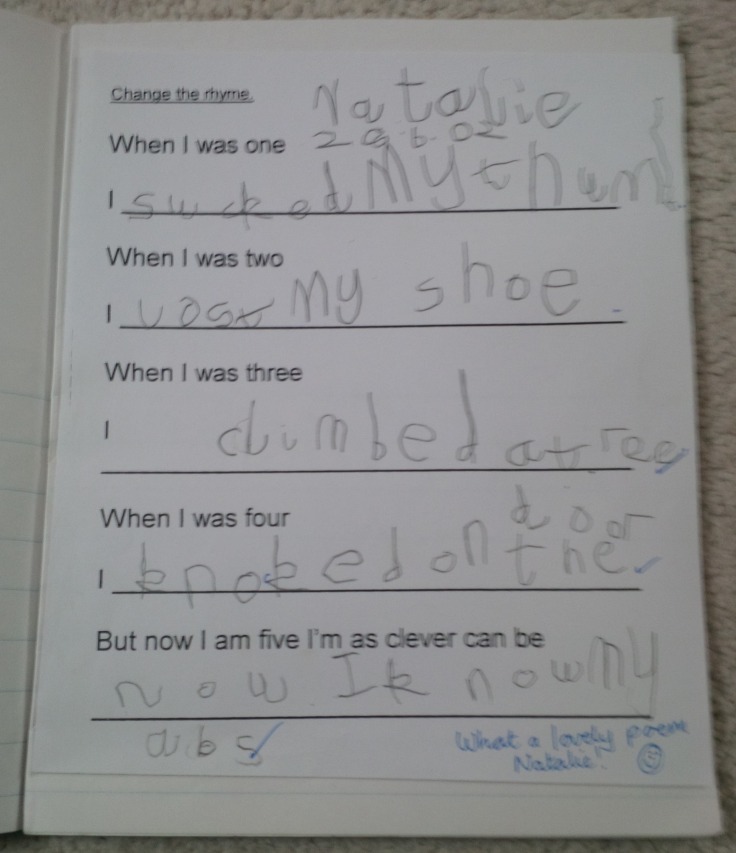








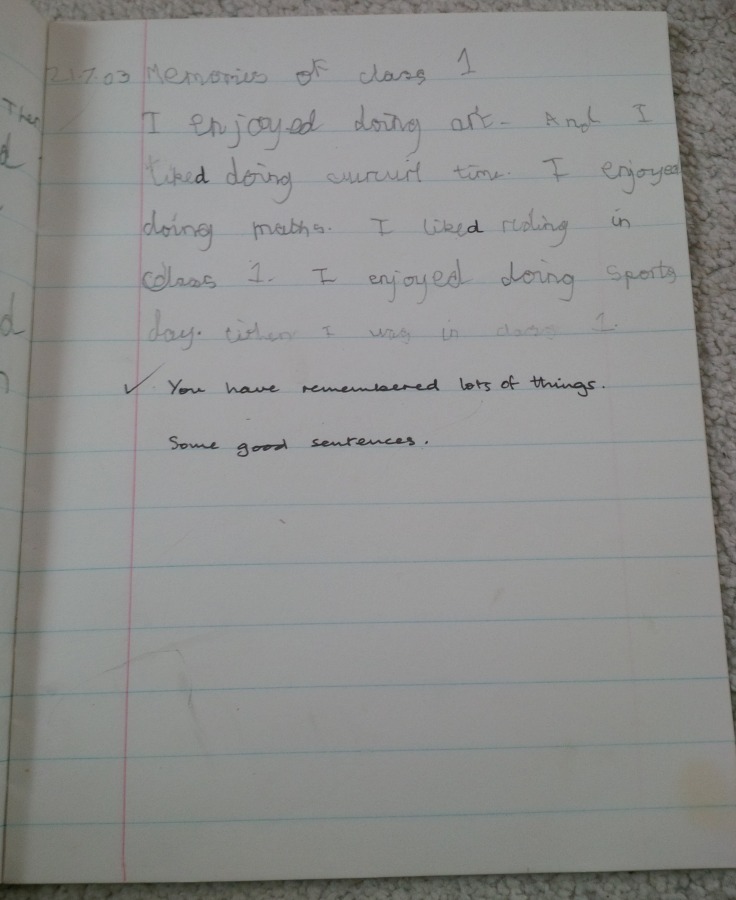
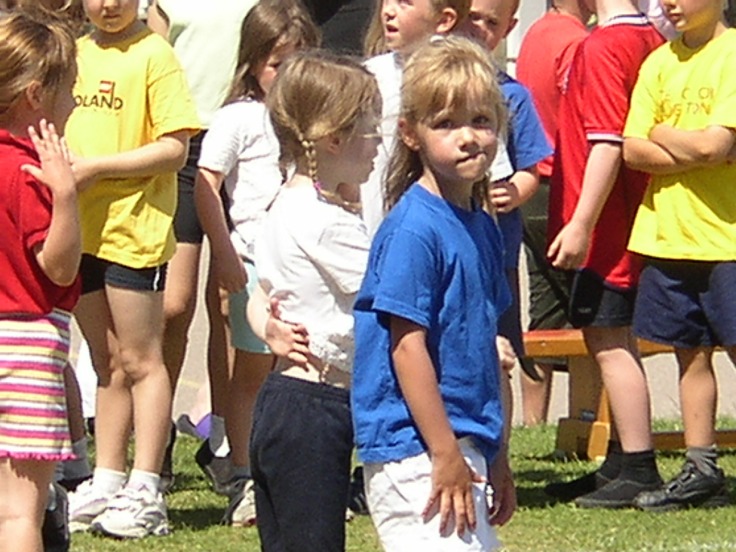


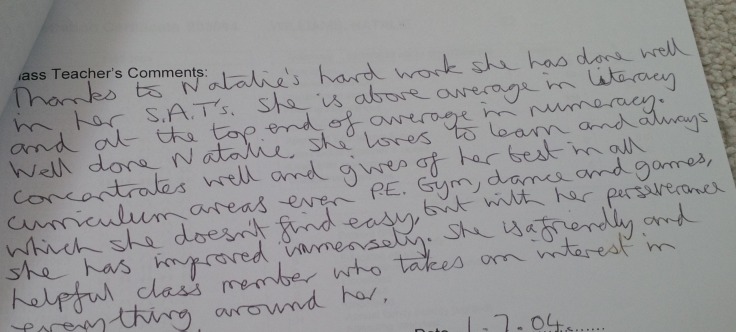



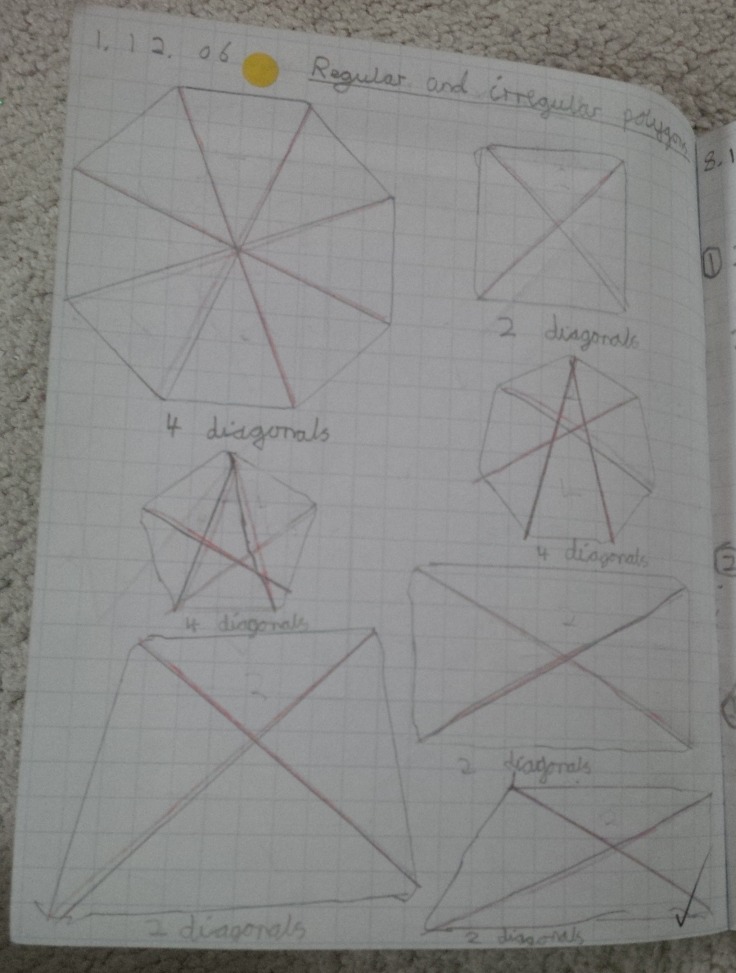



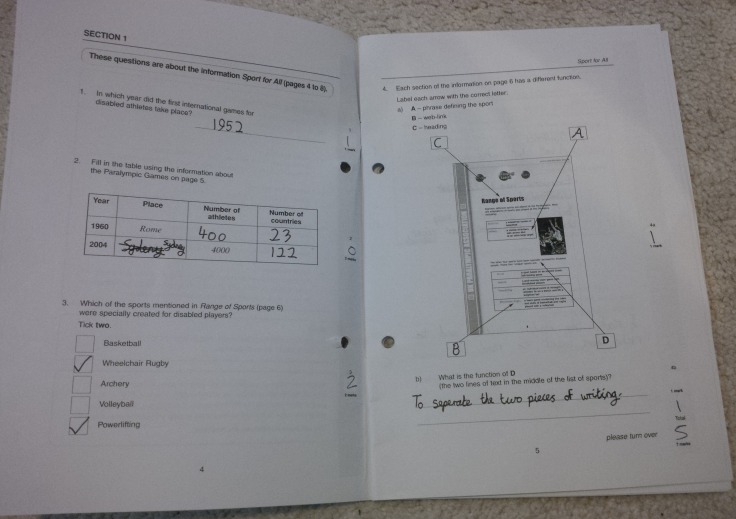


Ok…this is like my exact experiences in school but we did not find out about Dyspraxia till I was 28! So I had no words for it but the treatment was the same and I had the same comments in my margins of work and at PE. I was belittled and used as examples sometimes in PE of what not to do. I hated that class and recess…sometimes I would pretend to be sick ( or was from all the stress) and same with Math and hand writing ( thank God for computers now!)
I almost could not get through reading this post without a few panic triggers from when I was little…guess I will have to work through some of that with my new found lens of belonging and truth:)
thanks for writing!
LikeLike
Wow, I couldn’t imagine what it would be like not knowing about dyspraxia! That must have in a way been kind of a relief when you eventually found out? That’s absolutely awful that they used you as an example of what not to do in PE!!! Aww, yes at least you finally know now! Have you had a look at the Dyspraxia Foundation website? They have loads of great information on there and have a Facebook page/Twitter account too.
No problem, thank you to you for reading and for your comment! 🙂
LikeLike
Thank you for writing this Natalie. My son Jack, 5, is in the process of being officially diagnosed with Dyspraxia as we were lucky enough to have a great teacher for his first year at primary school who picked up on it. Jack has had lots of help since then and is doing brilliantly now, in fact the only problem we have at present is that he has come on so much that we are now finding it difficult to get him officially diagnosed!
I find it so helpful to read blogs like yours, written by people who actually know what they are talking about, to get an idea of what we might expect in the future for Jack. We talk to Jack about his Dyspraxia but not excessively I hope and we try to make things a little easier for him with specialised cutlery, angled writing surfaces and after school classes in ballet and swimming to help with his balance and coordination. All this is alongside the fine motor control and extra help he already receives at school.
If you have any advice for us as parents or for Jack about anything that would help in the future, or that we should avoid, we would very much appreciate your experience and knowledge!
Thank you again!
LikeLike
That’s great to hear that your son’s school is so supportive. Yes I was aware of my dyspraxia at around the age of 4 and I found it helpful knowing about it at that age. What you’re doing sounds fantastic. For me, having a go at things even if I didn’t think I’d like them made such a difference. I hated P.E. at school but decided to give disability athletics a go and found that I absolutely loved it! So I’d definitely say to encourage Jack to try new things (I know changes in routine can be difficult for people with dyspraxia!) although it sounds like you’re doing that already with swimming and ballet. No problem, I’m so glad you found it helpful! Thank you for reading and for your comment!
LikeLike
Yes I have…it helped a lot…I actually wrote about my experiences as an adult with Dyspraxia here:
http://worldwecreate.blogspot.ca/2015/02/dyspraxia-struggle-of-adult-with.html
and have also written about my son with dyspraxia here: http://worldwecreate.blogspot.ca/2015/01/confessions-of-unschooling-mother-links.html
it was a relief and one more piece of the puzzle after finding out I had Autism years ago something was still missing from my typical explanations of my struggles compared to some of my friends who were aspies who did not struggle as much as I in a lot of executive functioning areas…so it was a relief to research and hear dyspraxia…and get it finally!
LikeLike
Thank you! I’ve just had a read of the blog posts – they’re excellent! I could relate to a lot of what you’d said and I’ll definitely make sure to read your future blog posts 🙂
LikeLike
Thank you SO much for posting this! Unfortunately I only got diagnosed when I was 18 (I’m 19 now so it was a few months ago) and I’ve researched Dyspraxia but I find this blog post so helpful because it’s about your personal experience and it makes more sense to me now 😊
LikeLike
No problem! Thank you so much for reading it and for your comment! I’m so glad you found it helpful. If you have any questions at all then feel free to ask 🙂
LikeLike
Thank you. As the mum of a beautiful seven year old daughter with dyspraxia, currently navigating her way through Year 1 (in Australia), this was incredibly moving and helpful. You’ve shown me areas that I need to look out for her as she progresses through schooling and reminded me of aspects of her that should be celebrated, every day. Can I ask what you’re doing now that you’ve left school? You are obviously very articulate and have a wonderful sense of humour and I wish you all the best in your endeavours. I look forward to Part 2.
LikeLike
No problem, thank you to you for reading and for your lovely comment! I’m so glad that you found it helpful. I’m starting an undergraduate degree in Psychology in September as Psychology is one of the subjects I’ve studied at A Level and I love it! I’m going to a university that is close to home though so I can live at home and commute there each day. Really looking forward to it 🙂
LikeLike
Pip the puppet!!! My son is 13 and has just been diagnosed dyspraxic, and he had a short burst of Pip in Year 1 am sure I have a picture somewhere of him cuddling up with said puppet, reading this blog and looking at your work has made me smile, cry, bash myself up for calling him clumsy, lazy …… Thank you I will give him an extra tight hug when he gets home (if he will let me as a teenage boy 😳)
LikeLike
Ahh that’s a coincidence! Thought pip the puppet was just something random my school did haha. Aww must have been hard not knowing about his dyspraxia till now, but at least now you know! No problem, thank you so much for your comment!! 🙂
LikeLike
I was not diagnosed until University and my books and school reports are littered with very critical comments about unfinished work and taking more care, the worst part was they would make me stay in a t break to redo the work when my hands were exhausted. I was told I was lazy a lot as I was clearly so bright (I had a high reading age and a great vocabulary) I fell over all the time and was taken to hospital with concussion after falling off the climbing frame and yes I tripped over my feet running a few times and cut my face. My daughter is now in the end of year 6 and I have only just managed to get her diagnosed despite telling them since she was a toddler that she was dyspraxic. I was even told that I was projecting my own issues onto her. Dyspraxia runs in families but teachers are still painfully ignorant of the condition. If I had not fought for her to be assessed she would have slipped through the net entirely, I feel she has in some ways as she is about to start secondary school and still has been given no support despite being referred for occupational therapy we are still waiting on a very long list for an appointment. I still have issues with her school, Recently she was made to sit on an itchy carpet like a dog for humming and fidgeting, things that she is not aware she is doing. I complained and asked the teacher to educate herself about dyspraxia and never do that again. The texture of the carpet was very itchy against her legs and it was also humiliating for her. Nearly every time there is a supply teacher she comes home in tears as she has been made to redo work or told off for being disruptive. The education system has a very long way to go in supporting children with dyspraxia and actually understanding the condition. It affects people in different ways, It’s very much fine motor skills with us and balance but our speech is fine. More awareness is needed, thanks for the article 🙂
LikeLike
I bet it must have been a relief in a way to finally found out about dyspraxia when you were at university. Hope your university experiences were better than your school ones? Can’t believe your daughter’s experiences so far, I really do hope her experiences at secondary school are better! Not sure if you’ve read it already but part 2 is about my experiences at secondary school: https://theblogwithonepost.wordpress.com/2015/07/03/my-experiences-at-school-from-nursery-to-sixth-form-part-2/
Definitely agree that more awareness is needed! No problem, thank you so much for your comment! 🙂
LikeLike
I have CP, and I currently work in a primary school. The “I used to have a hamster, but now it is dead” had me laughing for a good 10 minutes! 🙂
LikeLiked by 1 person
Ahh okay, what year do you work with? Haha 🙂
LikeLike